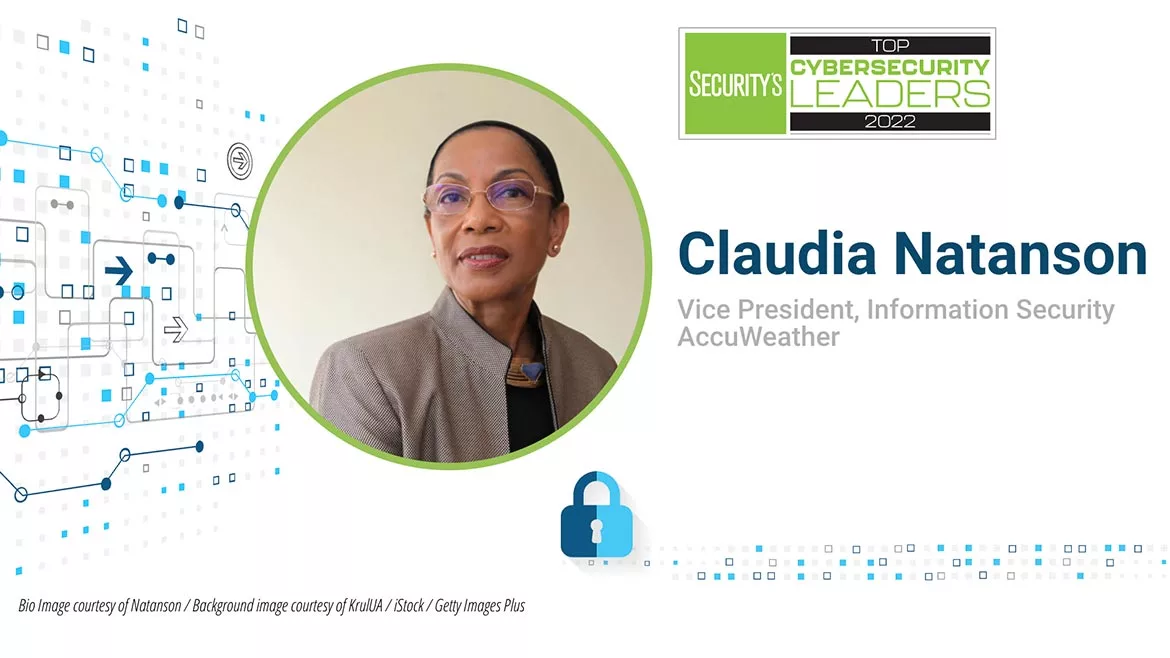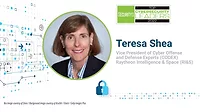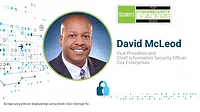Special Report
Winning hearts and minds in cybersecurity
Claudia Natanson, Vice President, Information Security, AccuWeather

Before becoming a highly distinguished cybersecurity leader, Claudia Natanson excelled in a different field: nuclear science.
“I was a nuclear scientist in the atomic spectroscopic field. While doing that, the vision of the growth and dependency on computing was front and center of mind. I combined those thoughts with observing the phenomenal growth of the internet, and I felt this was a field I wanted to challenge myself to be a part of,” Natanson explains.
After challenging herself, Natanson pursued a Master’s degree in Computer Science. She then started her Ph.D. and asked the university for something they had never considered before: to have the degree span two faculties, namely Education and Computer Science.
“I thought, if we’re going to become a digital society, it is vital to create awareness and training across all age groups,” she says. “I spent time understanding the basics of education and how it relates to special needs, as well as the use of technology to enhance learning and awareness for the technically driven world.”
Since obtaining her Master’s degree and Ph.D., Natanson has held leadership roles in several industry sectors — medical, retail, manufacturing, engineering and government — working and leading in up to 115 countries at any one time, and even having ownership of both physical and digital security.
Natanson’s past positions include Founder and Chair of GlobalCEP, Security at Security Practitioners; Digital Transformation Strategic Advisor at Aramark; Chief Security Officer (CSO) for the United Kingdom Department for Work and Pensions; Security Strategic Advisor at Intercept Pharmaceuticals; Chief Information Security Officer (CISO) at Diageo; and Head of former British Telecom (now BT) Secure Business Services. While at BT, Natanson founded the U.K.’s first commercial, globally accredited Computer Emergency Response Team, as well as formed and accredited BT’s commercial Computer Security Incident Response Team. In addition, she is a cybersecurity expert with the European Commission and is recognized by the FT as a top tech influencer. She also served as a Steering Committee member of the Forum of Incident Response and Security Teams (FIRST).
Her work across diverse industry sectors has taught her to become an emotionally intelligent leader, focusing on self-awareness, social awareness and empathy. “These key areas have stayed with me and are a core success factor for me, especially in my approach of ‘Winning Hearts and Minds,’” a phrase she uses often. When asked to explain this approach, Natanson says, “It is the cornerstone of successful security implementation. The principle is built on security collaboration that provides an understanding of what each person needs to do to help secure their organization. The result is heartfelt commitment and a security-aware mindset, so that over time everyone becomes a valued security ambassador.”
Using her “Winning Hearts and Minds” approach, Natanson has been able to engage with her teams, and the organization, thus enabling her to build high-performance teams and implement enterprise-wide digital transformations. “In any organization, security is everyone’s business,” she explains. “Together, we assume collective ownership and collective responsibility to continue to raise the bar on all security levels.”
In her role at AccuWeather as Vice President of Information Security, Natanson is focused on carrying her “Winning Hearts and Minds” approach to make steady progress in the security transformation program. “It’s also an approach to get leadership buy-in and commitment, which is absolutely necessary for success and a core requirement of most standards and regulations. The approach helps to position and see security as a business, not a technical requirement,” she explains.
At AccuWeather, Natanson has received leadership support and commitment, helping welcome lines of business and functions as an extension of the security program. “The outcome is delivering a program that does not belong only to the security team.” In the age of heightened security, AccuWeather business leaders help to promote proactive, rather than reactive, readiness by selecting their security ambassadors and incident response leaders to work as part of the security transformation program, she says.
For Natanson, emotional intelligence (EI) is a pillar of her leadership style. Together with Natanson, her teams undergo the study of EI, she says, by reading “Emotional Intelligence” by Daniel Goleman and “Blink” by Malcolm Gladwell. Created by two researchers, Peter Salovey and John Mayer, and later popularized by Goleman, EI is defined as having the ability to recognize, understand and manage one’s own emotions and recognize, understand and influence the emotions of others. In particular, Natanson has found EI helpful for deeply technical team members who may have difficulties conveying the importance of cybersecurity in technical discussions to others in the business.
Inviting team members to undertake the study of EI is an example of Natanson’s servant leadership. “The importance of having a trusted support system, or a safe haven, around you is invaluable for success. I hope to continue to be that support system for others in their journeys,” she says.
Her greatest accomplishment, Natanson says, is watching the individuals in her global mentoring program achieve personal goals and go on to accomplish even more than initially planned. “It is more fulfilling now to watch them utilize the same mentoring strategies I have ingrained in them to support others inside and outside their teams. Across the profession, many of us are creating a chain reaction of giving back and demonstrating that success isn’t success without making time to share, care and support others.”
For years, Natanson has focused on collaborating with organizations, colleagues and industry representations to make a difference in growing the diversity, equality and inclusion (DEI) agenda in cybersecurity. Her participation as Chair of the Board of Trustees for the U.K. Cyber Security Council and the (ISC)² Global DEI Task Force, inaugurated in 2021, has helped her continue to give back to the profession. “We’re faced with diverse challenges which need vision and thought leadership to attract, grow and support the security profession,” she explains. “At the U.K. Cyber Security Council, we are tasked with setting the highest standards for the profession, which includes creating diverse and simple pathways for entry into cybersecurity while providing inclusivity in our practice and collaboration at all times.”
DEI is a priority for the U.K. Cyber Security Council, and being part of the (ISC)² Global DEI Task Force has presented Natanson with an excellent opportunity to learn, she says. “It enables collaboration with other colleagues globally, and (ISC)² has continued to bring industry experts together, solicit active feedback and incorporate our thought leadership into their approach to demonstrate commitment to DEI.”
All in all, Natanson is committed to her mentorship, the U.K. Cyber Security Council, the Global DEI Task Force, and being a servant leader by promoting the need for the creation of safe havens, or areas where team members can grow confidence in decision-making without fear of reprisal and also practice EI and get to the heart of DEI. “Safe havens are needed to support, guide and strengthen personal confidence and make inclusivity and diversity critical success factors across teams and organizations,” she says.
Looking for a reprint of this article?
From high-res PDFs to custom plaques, order your copy today!






